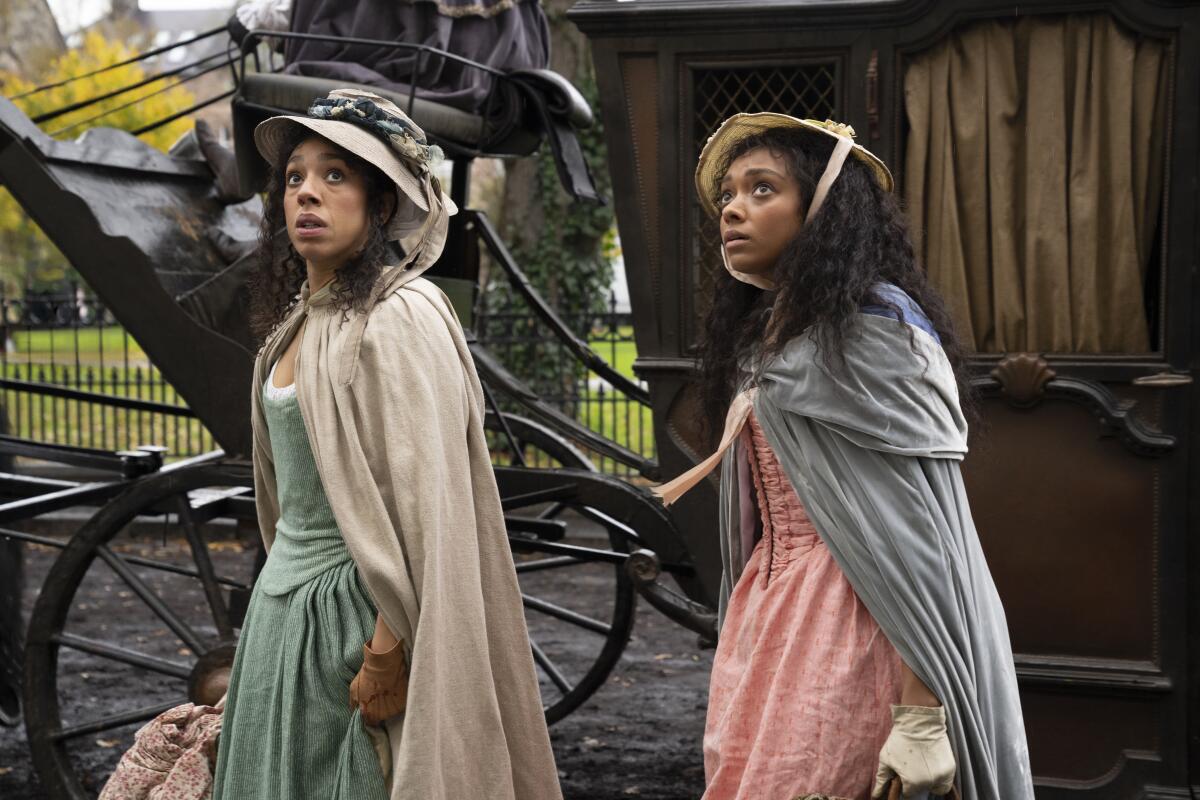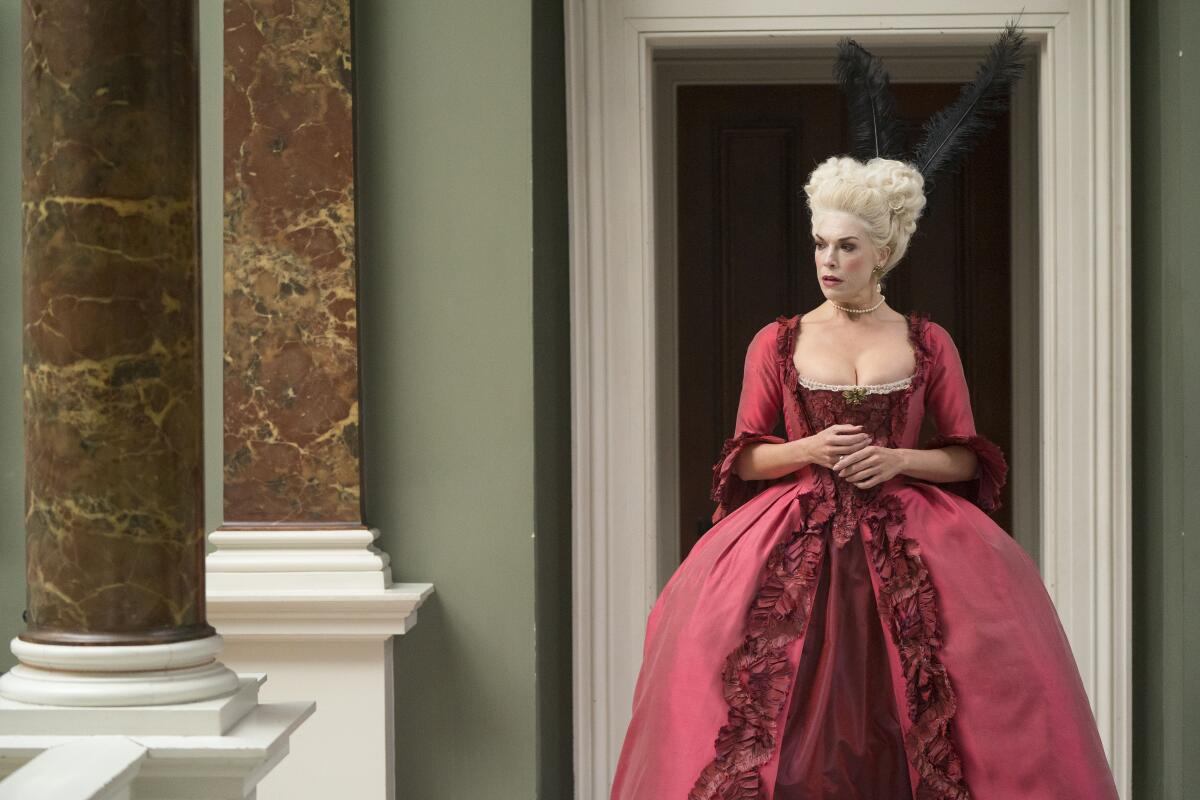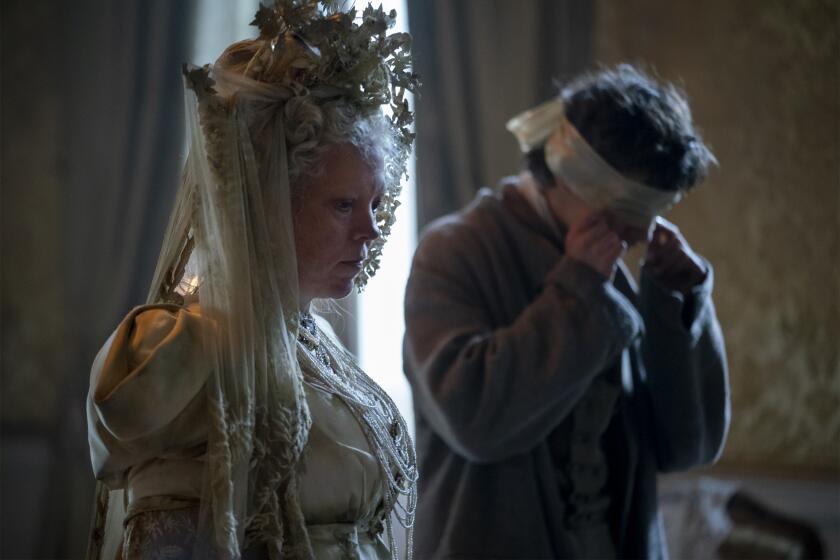‘Tom Jones’ review: PBS Masterpiece’s latest period drama is laid-back and enjoyable

- Share via
Where American television hustles to turn recently published beach reads into prestige series, literary classics — Austen, Dickens, Trollope, Waugh, et al. — have long been the bread and butter of British broadcasting. (At least as it’s understood by Americans.)
With their colorful characters, pretzel plots, romantic situations, grand set pieces, climactic revelations and seamless blend of drama and comedy, these books are made to be played. They are so full of vivid incident and dialogue that adaptation becomes more a matter of picking the best bits than filling out the time with new material or fixing what isn’t broken. (Though this does, sadly, happen.) Of course, every new generation will see the old books with a new eye.
“Tom Jones,” beginning a four-episode run Sunday on PBS, comes from Henry Fielding’s 1749 comic romp “The History of Tom Jones, a Foundling.” Written at the very dawn of the English-language novel, it charts the misadventures of the eponymous Tom (Solly McLeod), left as a baby in the bed of the symbolically named Squire Allworthy (James Fleet); his love for his neighbor Sophia Western (Sophie Wilde) and the missteps, misunderstandings and machinations that keep them apart for, like, a thousand pages.
This adaptation of Charles Dickens’ classic novel, which stars Olivia Colman, Fionn Whitehead and Shalom Brune-Franklin, is a very dark and different take.
The book is arguably best known as a movie, Tony Richardson’s rollicking 1963 Oscar-winning film, which took the story at a clip and highlighted its farcical elements with stylistic borrowings from Mack Sennett. (A six-part BBC adaptation, from 1997, aired here on A&E, but as far as I can tell, the new series is only the third screen version.) Adapted by Gwyneth Hughes, directed by Georgia Parris and co-produced by Britain’s ITV and PBS Masterpiece, the new series rollicks here and there, but with four hours to spend, it takes things at a relatively leisurely pace. Generally faithful to the material and made without stylistic overreach, it’s enjoyable in an earnest, laid-back sort of way and offers a less familiar period of period drama. The action ranges from country houses to wayside inns to London — which, as is often the case in such stories, is not all it’s cracked up to be.

Fielding cannot tell us too often or too breathlessly how handsome Tom is, and any “Tom Jones” adaptation requires that Tom, catnip to all women — not a seducer, but easily seduced — be charismatic in a natural, unpolished way, and McLeod fits the bill pretty well. (When Tom briefly acquires polish, it looks bad on him.) The embodiment of country virtue, liked by everyone it’s worth being liked by, he’s nevertheless at a social disadvantage owing to the hazy circumstances of his birth — left in Squire Allworthy’s bed, he’s believed to be the son of Jenny Jones, later known as Mrs. Waters (Susannah Fielding), and schoolteacher-barber Partridge (Daniel Rigby), in whose household she’s a maid.
Crucially it makes him an unsuitable match for Sophie, the beautiful girl at the manor next door, and it earns him the contempt of his crabbed rival, Mr. Blifil (James Wilbraham), the son of Squire Allworthy’s sister Bridget (Felicity Montagu). But Tom is without prejudice, a friend to high and low, a gentlemen by nature if not by birth; if anything, it’s the upper class who scheme for advantage and can’t see the true worth of things.
Circumstances drive a wedge between Tom and Squire Allworthy, and he sets off on the road. Sophia, too, will have reasons to leave home, and their travels will afford highly coincidental meetings (and near meetings) with characters they know, characters they knew and characters who turn out to be quite other than expected. (This last group leads to what might be called an Oedipal near miss.)
Partridge, whom Tom meets on way to London (and who, spoiler alert, is not his father), becomes in this version something more substantial and weightier than in the novel, less a comical sidekick and more a wise partner. Similarly, Hannah Waddingham (from “Ted Lasso”) gives a surprisingly tragic dimension to her possessive, manipulative Lady Bellaston, who conceives a liking for Tom and hinders his progress toward a happy ending.

The new series’ most obvious departure from the page, which is now standard practice in period drama, is in the diversity of its players. Wilde, who plays Sophia, is Black. But rather than colorblind casting offered without comment, Hughes has given her a explanatory backstory: The daughter of Squire Western (Alun Armstrong) in the novel, she here becomes his no-less-beloved granddaughter — the child of his late son, a plantation owner in Jamaica, and a slave. While treated as meaningful, it never grows into a theme, with Sophia’s character and beauty being more to the point — her race is barely remarked upon — and Wilde is all one would want in the part. She’s also made the narrator, which literally gives her a stronger voice — though Fielding’s women, while at the mercy of the times, are on the whole smart, interesting and not without agency.
Much of what is most delightful here comes from the corps of British character actors who fill out the supporting parts, including the ubiquitous Shirley Henderson as Sophia’s proper Aunt Western; Armstrong, perhaps best known for the old-cop series “New Tricks,” as the excitable Squire Western; and Fleet (lately King George in “Bridgerton”) as the moderate Squire Allworthy. And “Doctor Who” fans will be happy to see Pearl Mackie, companion to Peter Capaldi’s Twelfth Doctor, as Honour, companion to Sophia. From this side of the Atlantic, their mere presence tells a story inextricable from the story they’re telling. It doubles the pleasure, doubles the fun.
‘Tom Jones’
Where: KOCE (PBS)
When: 10 p.m. Sunday
Streaming: PBS Passport, any time, starting Sunday
Rating: TV-14 (may be unsuitable for children under the age of 14)
More to Read
The complete guide to home viewing
Get Screen Gab for everything about the TV shows and streaming movies everyone’s talking about.
You may occasionally receive promotional content from the Los Angeles Times.








